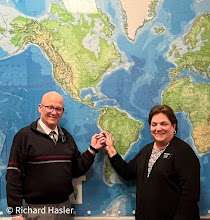Chacrakuy
 Sometimes the immensity of the gap in cultures that I live in astounds me. The rains have begun again as we finish our year’s end activities in Peru. The most important and the one that takes the most planning has to do with presents for children in our communities and a party that includes the adults. We also give panetone (Italian fruit cake, very popular in Peru) and spiced hot chocolate and call this fiesta a chocolatada. There are a host of complications the main one being that this is the planting time. This is a part of the world that depends upon potatoes and that is their only real crop. They raise scrawny sheep, gaunt cattle and stunted, jug-headed horses but this is the potato planting season. They do all of the planting with a tool called a chaquetaquea that is made from a bent wooden tree branch to which is fastened a sharpened truck spring with rawhide.
Sometimes the immensity of the gap in cultures that I live in astounds me. The rains have begun again as we finish our year’s end activities in Peru. The most important and the one that takes the most planning has to do with presents for children in our communities and a party that includes the adults. We also give panetone (Italian fruit cake, very popular in Peru) and spiced hot chocolate and call this fiesta a chocolatada. There are a host of complications the main one being that this is the planting time. This is a part of the world that depends upon potatoes and that is their only real crop. They raise scrawny sheep, gaunt cattle and stunted, jug-headed horses but this is the potato planting season. They do all of the planting with a tool called a chaquetaquea that is made from a bent wooden tree branch to which is fastened a sharpened truck spring with rawhide.This year we bought cake and chocolate for 6,300 and toys for children from 0 to 12 and went to about 18 communities to deliver the parties. It has been exhausting but quite rewarding since these are communities that have never had such an experience. They have been reasonably grateful but some have been a little less than receptive and demanding. We have spoiled some of them and many individuals in these communities have not really fully grown up. I have a friend who began his life with his girlfriend when they were eleven years old. They have six children today.
I have spent the better part of two weeks in the project doing this stuff and in the process have had some unique experiences. A week ago, we had been out and busy all morning when we came back for lunch. They saw us coming and sent emissaries to tell us not to eat but to come and join with the potato planters to see how they plant their potatoes. However when we got there they told us that we were to sit down and participate in what turned out to be something that felt about as ancient as anything I have ever seen or been a part of. They call it the chacrakuy, their very ceremonial lunch. It involved such things as eating cool sheep’s head soup from a communal bowl. This is only its name because aside from the head, it includes all of the feet and pretty much all of entrails of the sheep. They also have the ubiquitous freeze dried potatoes called chuñu and parched corn. I like the chuñu and corn but find the soup a little challenging. In this trip I also ate spicy lung, potato and hominy soup in a rough part of Lima but that is for another tale.
 The people all dress in their traditional clothing for the communal work called, “faena,” and after the meal, the men all sit like little kids playing choo choo train on two of the potato rows.
The people all dress in their traditional clothing for the communal work called, “faena,” and after the meal, the men all sit like little kids playing choo choo train on two of the potato rows.
One man is designated the server called servicio. He is really a master of ceremonies of sorts with a twist. He is charged with serving chicha brewed from the chuñu, a disgusting, sour-mash, grayish brown soupy looking drink. It is quite alcoholic and each man is delivered two ancient and well worn cows’ horns-full.
People go to specific faenas because of the servicio that day. They are especially popular, the funnier they are. It is all done with a lot of joking, clowning around and gets more and more animated the more chichi they drink.
 When the women did sing, I was positively blown away. I have heard much music here but that sounded like something out of a Hopi burial ceremony or something. They cover their face and chant a tune that sounds very North American Indian in tone. I truly felt like I participated in something very much from the deepest ancestors of these people.
When the women did sing, I was positively blown away. I have heard much music here but that sounded like something out of a Hopi burial ceremony or something. They cover their face and chant a tune that sounds very North American Indian in tone. I truly felt like I participated in something very much from the deepest ancestors of these people.Labels: Ancient planting traditions

1 Comments:
Very cool experience!
Post a Comment
<< Home